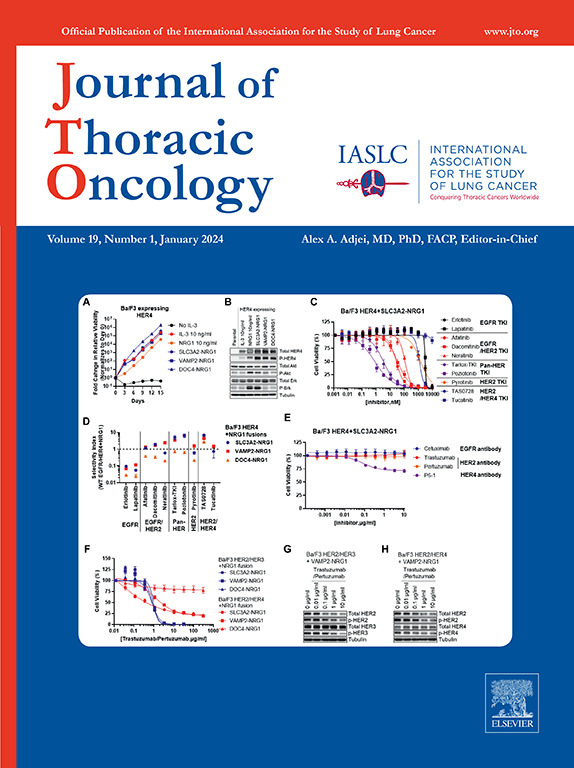From the International Association for the Study of Lung Cancer Early Detection and Screening Committee: Terminology Issues in Screening and Early Detection of Lung Cancer—International Association for the Study of Lung Cancer Early Detection and Screening Committee Expert Group Recommendations
IF 21
1区 医学
Q1 ONCOLOGY
引用次数: 0
Abstract
Introduction
To facilitate global implementation of lung cancer (LC) screening and early detection in a quality assured and consistent manner, common terminology is needed. Researchers and clinicians within different specialties may use the same terms but with different meanings or different terms for the same intended meanings.
Methods
The Diagnostics Working Group of the International Association for the Study of Lung Cancer Early Detection and Screening Committee has analyzed and discussed relevant terms used on a regular basis and suggests recommendations for consensus definitions of terminology applicable in this setting. We explored how to reach consensus to define relevant and unambiguous terminology for use by health care providers, researchers, patients, screening participants, and family.
Results
Terms and definitions for epidemiologic and health-economical purposes included the following: standardized incidence and mortality rates, LC-specific survival, long-term survival and cure rates, overdiagnosis, overtreatment, and undertreatment. Terms and definitions for defining screening findings included the following: positive, false-positive, negative, false-negative, and indeterminate findings and additional and incidental findings. Terms and definitions for describing parameters in screening programs included the following: opportunistic versus programmatic screening, screening rounds, interval or interim diagnoses, and invasive and minimally invasive procedures. Terms and definitions for shared decision-making included the following: LC screening—possible harms and risks and LC risk and modifiers prior and posterior to a measure.
Conclusions
A common set of terminology with standard definitions is recommended for describing clinical LC screening programs, the discussion about effectiveness and outcomes, or the clinical setting. The use of the terms should be clearly defined and explained.
摘自 IASLC 早期检测和筛查委员会肺癌筛查和早期检测术语问题 - IASLC 早期检测和筛查委员会专家组建议。
导言:为促进在全球范围内以有质量保证且一致的方式实施肺癌筛查和早期检测,需要使用通用术语。不同专业的研究人员和临床医生可能使用相同的术语,但含义不同,或者使用不同的术语表达相同的含义:方法:国际肺癌研究协会早期检测和筛查委员会诊断工作组分析并讨论了定期使用的相关术语,并就适用于该环境的术语的共识定义提出了建议。我们探讨了如何达成共识,以定义相关且明确的术语,供医疗服务提供者、研究人员、患者、筛查参与者和家属使用:结果:用于流行病学和健康经济学目的的术语和定义包括标准化发病率和死亡率、低密度脂蛋白血症特定存活率、长期存活率和治愈率,以及过度诊断、过度治疗和治疗不足。用于定义筛查结果的术语和定义包括阳性、假阳性、阴性、假阴性和不确定结果以及附加和偶然结果。用于描述筛查计划参数的术语和定义包括机会性筛查与计划性筛查、筛查轮次、间期/中期诊断、侵入性和微创性程序。共同决策的术语和定义包括低血糖筛查--可能的危害和风险,低血糖风险及措施前后的调节因素:建议在描述临床 LC 筛查计划、讨论有效性和结果或临床环境时使用一套具有标准定义的通用术语。术语的使用应明确定义和解释。
本文章由计算机程序翻译,如有差异,请以英文原文为准。
求助全文
约1分钟内获得全文
求助全文
来源期刊

Journal of Thoracic Oncology
医学-呼吸系统
CiteScore
36.00
自引率
3.90%
发文量
1406
审稿时长
13 days
期刊介绍:
Journal of Thoracic Oncology (JTO), the official journal of the International Association for the Study of Lung Cancer,is the primary educational and informational publication for topics relevant to the prevention, detection, diagnosis, and treatment of all thoracic malignancies.The readship includes epidemiologists, medical oncologists, radiation oncologists, thoracic surgeons, pulmonologists, radiologists, pathologists, nuclear medicine physicians, and research scientists with a special interest in thoracic oncology.
 求助内容:
求助内容: 应助结果提醒方式:
应助结果提醒方式:


